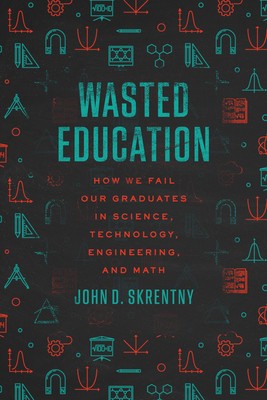
- We will send in 10–14 business days.
- Author: John D Skrentny
- Publisher: University of Chicago Press
- ISBN-10: 0226845419
- ISBN-13: 9780226845418
- Format: 15.2 x 22.9 x 1.5 cm, minkšti viršeliai
- Language: English
- SAVE -10% with code: EXTRA
Reviews
Description
An urgent reality check for America's blinkered fixation on STEM education.
We live in an era of STEM obsession. Not only do tech companies dominate American enterprise and economic growth while complaining of STEM shortages, but we also need scientific solutions to impending crises. As a society, we have poured enormous resources--including billions of dollars--into cultivating young minds for well-paid STEM careers. Yet despite it all, we are facing a worker exodus, with as many as 70% of STEM graduates opting out of STEM work. Sociologist John D. Skrentny investigates why, and the answer, he shows, is simple: the failure of STEM jobs.
Wasted Education reveals how STEM work drives away bright graduates as a result of "burn and churn" management practices, lack of job security, constant training for a neverending stream of new--and often socially harmful--technologies, and the exclusion of women, people of color, and older workers. Wasted Education shows that if we have any hope of improving the return on our STEM education investments, we have to change the way we're treating the workers on whom our future depends.
EXTRA 10 % discount with code: EXTRA
The promotion ends in 23d.02:39:07
The discount code is valid when purchasing from 10 €. Discounts do not stack.
- Author: John D Skrentny
- Publisher: University of Chicago Press
- ISBN-10: 0226845419
- ISBN-13: 9780226845418
- Format: 15.2 x 22.9 x 1.5 cm, minkšti viršeliai
- Language: English English
An urgent reality check for America's blinkered fixation on STEM education.
We live in an era of STEM obsession. Not only do tech companies dominate American enterprise and economic growth while complaining of STEM shortages, but we also need scientific solutions to impending crises. As a society, we have poured enormous resources--including billions of dollars--into cultivating young minds for well-paid STEM careers. Yet despite it all, we are facing a worker exodus, with as many as 70% of STEM graduates opting out of STEM work. Sociologist John D. Skrentny investigates why, and the answer, he shows, is simple: the failure of STEM jobs.
Wasted Education reveals how STEM work drives away bright graduates as a result of "burn and churn" management practices, lack of job security, constant training for a neverending stream of new--and often socially harmful--technologies, and the exclusion of women, people of color, and older workers. Wasted Education shows that if we have any hope of improving the return on our STEM education investments, we have to change the way we're treating the workers on whom our future depends.


Reviews